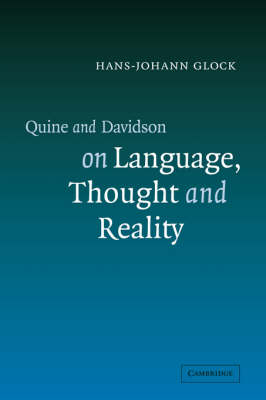
Quine and Davidson on Language, Thought and Reality
Seiten
2003
Cambridge University Press (Verlag)
978-0-521-82180-3 (ISBN)
Cambridge University Press (Verlag)
978-0-521-82180-3 (ISBN)
The influence of Quine and Davidson on contemporary philosophy is second to none, and their impact is also strongly felt in disciplines such as linguistics and psychology. This book is devoted to both of them, but also questions some of their basic assumptions.
Quine and Davidson are among the leading thinkers of the twentieth century. Their influence on contemporary philosophy is second to none, and their impact is also strongly felt in disciplines such as linguistics and psychology. This book is devoted to both of them, but also questions some of their basic assumptions. Hans-Johann Glock critically scrutinizes their ideas on ontology, truth, necessity, meaning and interpretation, thought and language, and shows that their attempts to accommodate meaning and thought within a naturalistic framework, either by impugning them as unclear or by extracting them from physical facts, are ultimately unsuccessful. His discussion includes interesting comparisons of Quine and Davidson with other philosophers, particularly Wittgenstein, and also offers detailed accounts of central issues in contemporary analytic philosophy, such as the nature of truth and of meaning and interpretation, and the relation between thought and language.
Quine and Davidson are among the leading thinkers of the twentieth century. Their influence on contemporary philosophy is second to none, and their impact is also strongly felt in disciplines such as linguistics and psychology. This book is devoted to both of them, but also questions some of their basic assumptions. Hans-Johann Glock critically scrutinizes their ideas on ontology, truth, necessity, meaning and interpretation, thought and language, and shows that their attempts to accommodate meaning and thought within a naturalistic framework, either by impugning them as unclear or by extracting them from physical facts, are ultimately unsuccessful. His discussion includes interesting comparisons of Quine and Davidson with other philosophers, particularly Wittgenstein, and also offers detailed accounts of central issues in contemporary analytic philosophy, such as the nature of truth and of meaning and interpretation, and the relation between thought and language.
Hans-Johann Glock is Reader in Philosophy at the University of Reading. He is the author of A Wittgenstein Dictionary (1996) which has been translated into German, French, Portuguese and Polish.
Acknowledgements; List of abbreviations; Introduction; 1. Logical pragmatism; 2. Ontology; 3. Analyticity, apriority and necessity; 4. Truth; 5. Meaning and truth; 6. Radical translation and radical interpretation; 7. Indeterminacies; 8. Meaning and understanding; 9. Thought and language; References; Index.
| Erscheint lt. Verlag | 27.2.2003 |
|---|---|
| Verlagsort | Cambridge |
| Sprache | englisch |
| Maße | 161 x 236 mm |
| Gewicht | 685 g |
| Themenwelt | Geisteswissenschaften ► Philosophie ► Erkenntnistheorie / Wissenschaftstheorie |
| Geisteswissenschaften ► Philosophie ► Metaphysik / Ontologie | |
| Geisteswissenschaften ► Philosophie ► Philosophie der Neuzeit | |
| Geisteswissenschaften ► Philosophie ► Sprachphilosophie | |
| ISBN-10 | 0-521-82180-0 / 0521821800 |
| ISBN-13 | 978-0-521-82180-3 / 9780521821803 |
| Zustand | Neuware |
| Haben Sie eine Frage zum Produkt? |
Mehr entdecken
aus dem Bereich
aus dem Bereich
die Grundlegung der modernen Philosophie
Buch | Softcover (2023)
C.H.Beck (Verlag)
18,00 €
Buch | Softcover (2023)
Reclam, Philipp (Verlag)
7,00 €

![Was heißt Denken?. Vorlesung Wintersemester 1951/52. [Was bedeutet das alles?] - Martin Heidegger](/media/113619842)
